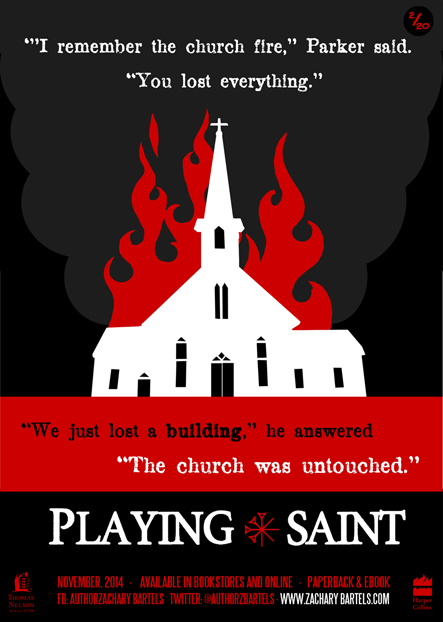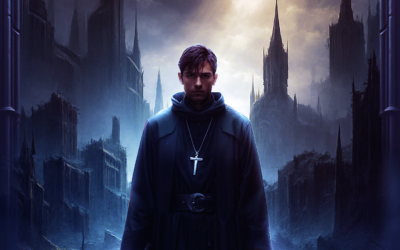Playing Saint by Zachary Bartels, which came out in 2014, gets top score in my book. As a pop Christian novel, it does an excellent job of intertwining history, intrigue, character development and theology.
The protagonist is an up-and-coming tele-evangelist called Parker Saint. In avoiding a scandal, he comes face to face with “a demanding detective, a trio of secretive Vatican operatives, and a centuries-old conspiracy to conceal a mysterious relic.” This premise is truly far-fetched. However, it is tempting enough of a premise that it pulls you in. You find out about his family background, his aspirations, his love-interest, and then comes the CSI connection and you’re hooked. It’s a fun ride. But what makes it excellent is that it is written by a pastor with a vision for the Great Commission.
Too many novels labelled as Christian fall short of true redemption. In a sense, they find resolution in a “job well done” or a “husband/wife gained.” This trend reminds me a lot of Matthew 24:27-29, where Jesus says
“For as were the days of Noah, so will be the coming of the Son of Man. For as in those days before the flood they were eating and drinking, marrying and giving in marriage, until the day when Noah entered the ark, and they were unaware until the flood came and swept them all away, so will be the coming of the Son of Man.”
Though nothing is wrong with marriage; the point of the passage is that life is more than just “doing your thing.” The main message of Christ’s ministry was “Judgment Day is coming, get right with God.” This is the very same wonderful message of Zachary Bartels’s book. The primary movement in the story centers around recognizing falsehood in your life and urgently finding Truth.
Playing Saint delves into topics that are currently leading the Church astray, particularly “Narcissistic Christianity” which is popular in tele-evangelism, and unbiblical demonology which is rampant worldwide.
I commend Zachary Bartels for using his writing platform to fulfill the universal Christian call to ministry. As it says in 1 Timothy 4:1-5:
I charge you in the presence of God and of Christ Jesus, who is to judge the living and the dead, and by his appearing and his kingdom: preach the word; be ready in season and out of season; reprove, rebuke, and exhort, with complete patience and teaching.
For the time is coming when people will not endure sound teaching, but having itching ears they will accumulate for themselves teachers to suit their own passions, and will turn away from listening to the truth and wander off into myths. As for you, always be sober-minded, endure suffering, do the work of an evangelist, fulfill your ministry.
My teenage daughters laugh at some Christian novels that, to validate themselves, have subtitles to the effect of “an action-packed Christian thriller,” which is like telling the punchline before you get into a joke. In my opinion, the caliber of a novel will pull those phrases out of readers. There is a definite need for suspense novels for Christians. After a hard day’s work, we sometimes need to escape into fiction. But also there is a definite call for ratcheting-up the quality of those Christian novels to meet the spiritual hunger and confusion of modern-day Christians. Meat. Perspective. Instruction in righteousness. Exhortation and comfort.
Hollywood and the pulp-fiction market shovel out adventure and romance that spins Narcissistic Hedonism as the end-all to aspire for. When you read a novel or watch a movie, brain cells called “mirror neurons” physically cause you to have empathy, and enable you to live vicariously through the lives of the characters you are reading about or watching. This is a scary thing if a reader is not cautious about the “in-portal” to their mirror neurons.
Our moments on earth are limited. When we choose to be entertained for the hours it takes to read a book, we are submitting our minds to be shaped by some author or another. What will happen depends on that author’s values and worldview. But if we carefully choose our “teachers,” we can become better after our time in that book. Especially when the writer’s message is Christ’s message, Paul’s message, John’s message. This is what makes Playing Saint so refreshing.
Thank you, Zachary Bartels, for doing for Christian fiction what we hope more writers will do. I look forward to reading The Last Con, because I know I will be a better Christian after reading it. You recognize your responsibility to me.
—
update 2/2019 (See review of We Hope for Better Things, by Erin Bartels, the wife of Zachary Bartels)


